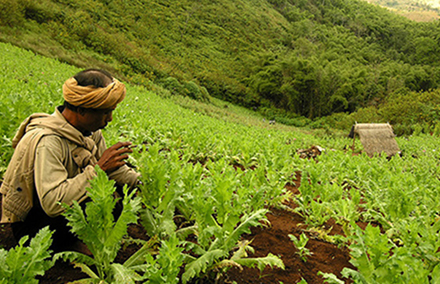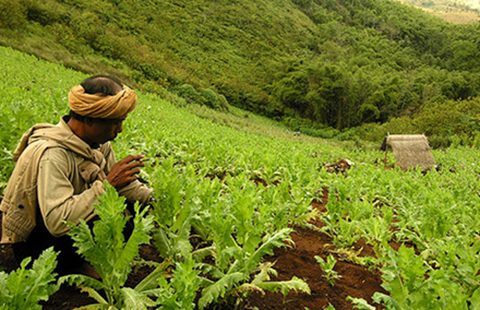
A poppy field in Myanmar. Photo: UNODC.
Alternative development programs won’t win the global war on drugs. But the help they provide impoverished local farmers in Myanmar make them all the more worthwhile.
As I have argued previously on New Mandala, short-term goals that encourage destroying poppy fields in Myanmar’s Shan state are no solution to a complex and unstable problem.
These short-term aims are both impotent on a global level and damaging at a local level.
Unless the poppy farmers have viable alternatives, eradication only has a negligible effect on poppy cultivation as farmers replant their poppy fields – not because they are hardened criminals, but rather that they have no alternatives.
Eradication also goes hand-in-hand with violence, a culture of distrust, and further poverty.
Improving the poppy situation in Shan is no easy task, and the only way for such improvement to happen is if poppies are replaced with comparably economically viable crops.
However, it takes far longer for such crops to bear fruit, and even longer to master the associated techniques.
Take coffee for example, the flagship crop of United Nations Office on Drugs and Crime alternative development projects.
Coffee plants take three years to mature, at which point the value of a hectare is a meagre $1,713.60 (compared to $4,843 for opium), and it takes a full six years for this to increase to a comparable $4,760.
Aside from the trust needed to assure farmers that the coffee they’re planting – which most have never even tasted – will return such dividends, other problems exist.
These include the markets where the coffee is sold need to be developed and the roads upon which the coffee is to be transported need to be built, which also takes time. Once these issues are dealt with however, farmers will have no reason to grow poppy.
Even once such alternatives are successfully developed and Shan farmers no longer grow poppy, the effect on global poppy cultivation rates will be negligible.
Poppy cultivation will simply shift to another region via what is known as the ‘Balloon Effect’, where the local successes of clampdowns in drug producing regions are overshadowed globally by subsequent increases elsewhere – just as squeezing one end of a balloon will cause the other end to expand.
Thus, while giving farmers alternative crops is great for Shan state as it addresses the poverty which lies at the heart of the issue, on a global level, the most that alternative development projects can achieve is poppy displacement.
Thailand offers a pertinent example here.
Alternative development projects were extremely successful in eradicating the once 200-ton-a-year Thai poppy industry and transforming regions formerly ravaged by poppy production and organised crime into areas famous for flowers and tourism.
However, the long run effect of such projects was merely the shift of poppy cultivation to other areas in the region such as Myanmar and Laos.
Why bother at all then?
On a global level, perhaps there is no point. But, on a local level such projects are extremely effective in not only curbing poppy cultivation and therefore at removing a key cause of instability in one of the most unstable and volatile regions in the world, but also in the alleviation of acute poverty – both which vastly improve the lives of countless individuals who live in the region.
Global poppy policy needs to realise that drugs aren’t going anywhere soon.
The failure to recognise this has resulted in decisions that risk making a precarious situation even more unstable. Only when the realities of the situation of poppy farmers in Shan state are properly comprehended can any progress be made.
Ultimately, the conclusion that the most which can be achieved with curbing poppy production is regional and not global may appear to be an overly pessimistic. In many ways it is – especially when compared to the wholly unrealistic goals set by international organisations.
However, while alternative development projects will not end global opiate production, they have an immeasurable improvement on the lives of those who live in poppy cultivating regions.
People who currently live lives of extreme coercion, poverty, and above all, hopelessness.
Charlie Artingstoll is a graduate of Cambridge University and has just finished working at the United Nations Office on Drugs and Crime in Myanmar.
This article is the final in a three-part series on tackling Myanmar’s opium trade. Read the first and second articles.
 Facebook
Facebook  Twitter
Twitter  Soundcloud
Soundcloud  Youtube
Youtube  Rss
Rss 